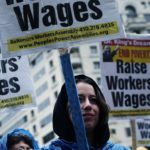 In job markets where bosses have more say in setting pay rates, raising the minimum wage often leads to more jobs, according to a new study.
In job markets where bosses have more say in setting pay rates, raising the minimum wage often leads to more jobs, according to a new study.
Researchers from the University of Pennsylvania looked at what happens when the minimum wage goes up in low-paying retail jobs. They also considered nationwide data on how many businesses compete for workers. This study’s results apply to not just fast-food jobs but to all low-paying work.
“We find that in labor markets that are more concentrated or less densely populated, minimum wage increases lead to overall positive employment effects,” the researchers explain.
Increasing pay
The results show that in job markets where there’s less competition and bosses have more control over wages, they can increase pay rates. This is especially true in markets where there are very few employers dominating the field. In such cases, when the minimum wage goes up, more people get hired.
This study offers proof that the level of “monopsony power” — which means how much companies can pay workers less than what they really contribute to the company’s profits — can shape the impact of minimum wage changes on job numbers.
“This paper provides compelling evidence that responses to a key labor market institution (the minimum wage) are influenced by the structure of the labor market. As such, the findings also help to further underscore the role of employer concentration in the labor market,” the researchers conclude.